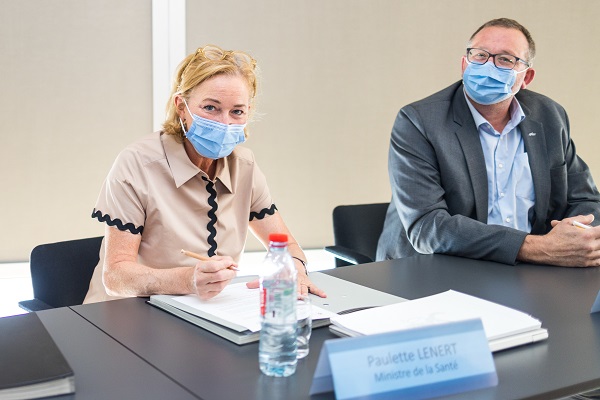 L-R: Paulette Lenert, Luxembourg's Minister of Health; Pierre Plumer, Director General of Domaine Thermal Mondorf;
Credit: MSAN / CHL Pol Foguenne
L-R: Paulette Lenert, Luxembourg's Minister of Health; Pierre Plumer, Director General of Domaine Thermal Mondorf;
Credit: MSAN / CHL Pol Foguenne
At a press conference on Wednesday, Luxembourg's Minister of Health, Paulette Lenert, presented the long COVID multidisciplinary care network pilot project, which will launch in the Grand Duchy on 1 August 2021.
Scheduled for a period of six months, this pilot project has been developed to adequately respond to the emergence of this new public health problem known as "long COVID".
The authorities noted that a not insignificant number of COVID-19 patients have sequelae of the disease for several weeks or months. These patients may experience persistent fatigue, neurological disorders (cognitive, sensory, headache, "brain fog"), cardiac disorders (chest pain and tightness, tachycardia, shortness of breath, coughing) or even smell and taste disorders. Joint pain, digestive and skin disorders are also common. Symptoms vary in presentation and intensity and may also fluctuate over time. Long COVID generally refers to cases where symptoms persist beyond three months after the acute phase of infection.
“Many patients do not manage to recover from their post-acute phase, they see their life 'shattered', do not manage to resume a professional activity or even the usual activities of their daily life. They no longer recognise themselves in their daily life and suffer from various ailments which do not allow them to return to their former life. This challenged me", explained Minister Paulette Lenert, for whom "a pragmatic, rational and scientific approach to the care of these patients, within the framework of a shared, multidisciplinary medical decision, is necessary".
It is estimated that around 1% of the almost 70,000 cases of people infected in Luxembourg since March 2020 are concerned, i.e. around 700 patients.
Multidisciplinary care
“In the vast majority of cases, the treatment of these prolonged symptoms, during a COVID-19 disease, is carried out in primary care by general practitioners. However, for a certain number of patients in whom severe symptoms persist, carrying out additional examinations and coordinated multidisciplinary care in a hospital environment are necessary to exclude decompensation of comorbidities following COVID-19", commented Dr Stéphanie Obertin, President of the Luxembourg GP association, Cercle des médecins généralistes.
Documentation, in connection with the different stages of care, must be carried out in parallel, in a structured manner, in order to support any research work. A thorough clinical examination, empathetic listening and examination of the patient as a whole are deemed necessary to make a diagnosis in relation to these prolonged symptoms. Care includes a specific history, measurement of vital parameters, the use of validated assessment scales and a paraclinical parsimonious assessment.
Luxembourg's Health Minister added: “The treatment of the new long-COVID pathology must be done in partnership with general practitioners and rehabilitation establishments as well as all other rehabilitation specialists so as to develop a dedicated care network".
To this end, the Health Ministry signed a financing agreement with the partner structures of the network, namely the national infectious disease department of the Centre Hospitalier de Luxembourg (CHL), the Rehazenter rehabilitation centre and the Domaine Thermal Mondorf.
As stated by Dr Gaston Schütz, Director General of Rehazenter: “To date, the treatments of long COVID patients are essentially symptomatic and rehabilitation occupies a central place: respiratory rehabilitation in the event of pulmonary syndromes, olfactory rehabilitation in the event of persistent odour disorders or exercise re-training which must be carried out gradually and adapted to the possibilities of each patient".
"Listening to, supporting and educating patients are an integral part of the treatment so as to teach patients to self-manage, to know their limits but also to continue even moderate physical activities in the absence of contraindications", added Pierre Plumer, Director General of Domaine Thermal Mondorf.
In addition, the examination of anxiety and depressive disorders, functional disorders and the proposal of psychological or even psychiatric support should be considered at all stages of the follow-up.
This support will therefore be accessible to patients at the national level in a multidisciplinary organisation in order to offer them in an individualised and optimal way multidisciplinary rehabilitation and support services.
The clinical journey of a long COVID patient will follow three main stages:
- A patient who presents symptoms of long COVID must first consult his / her general practitioner (or specialist physician), who will direct him / her to a long COVID consultation according to well-defined admission criteria and beyond the possibilities of primary care, i.e. only if a complementary hospital assessment and / or multidisciplinary care is necessary.
- Next, the patient will make an appointment at the CHL national infectious disease department. “During [this] first consultation, a complete patient history will be taken with a Case Manager, on the basis of a standardised questionnaire, making it possible to identify the predominant symptoms that will require a possible examination, but also to determine the emergency criterion and prioritisation for care. After consultation with the coordinating doctor for the patient assessment, a decision on therapeutic orientation within the skills network is taken, based on the specific needs of the patient", explained Dr Thérèse Staub, head physician of the department.
- If specialised care proves to be necessary, the patient will be transferred to partner structures, i.e. either to Rehazenter or to Domaine Thermal Mondorf.
Minister Paulette Lenert concluded: “It is essential that long COVID patients are treated appropriately and that they avoid a long and exhausting diagnostic journey".
The budget dedicated to the pilot project, which will be launched on 1 August 2021, amounts to €1.01 million.








